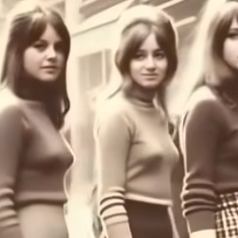At first glance, the picture seems simple: a moment frozen in time, nothing more than a nostalgic snapshot. But when you look closer, something shifts. The image captures a vivid essence—an unmistakable energy from the 1970s—expressed through fashion that carried meaning far beyond fabric and color. What makes the photo remarkable isn’t a filter or a modern edit, but the powerful story woven into the decade’s style.
The 1970s were a turning point. Fashion was no longer just clothing; it became a form of cultural expression, protest, discovery, and identity. What looks “normal” at first glance becomes extraordinary when you understand what the era represented.
When Fashion Became Relaxed, Confident, and Personal
Early in the decade, a major shift began. The stiff, proper elegance of earlier generations gave way to something new—comfort, freedom, and personality. The ‘70s weren’t about following rules. They were about breaking them with confidence.
For many women, this change felt revolutionary. Clothing wasn’t just about appearance anymore—it reflected movement, independence, and a growing voice in society. Designers embraced softer silhouettes, fluid fabrics, and relaxed forms that allowed women to express who they were instead of who they were expected to be.
The fashion world responded with enthusiasm. Items that once felt bold or unusual quickly became symbols of individuality.
Women Who Defined a Decade
Some of the most iconic looks of the 1970s emerged from women who didn’t just wear fashion—they embodied it.
Diana Ross
With shimmering gowns, bold fabrics, and dramatic stage presence, Diana Ross turned fashion into a performance. Her flowing bronze gown from 1970 exemplified the era’s love for shine, soul, and glamour.
Bianca Jagger
Bianca Jagger became a symbol of daring sophistication. Whether stepping into Studio 54 wearing a slinky lamé dress or redefining elegance in tailored pieces, she represented a generation embracing fearless self-expression.
These women weren’t following trends—they were setting them. Their style choices became cultural statements that still influence fashion today.
The Disco Era: Sparkle, Rhythm, and Attitude
If one movement captured the spirit of the late ‘70s, it was disco.
Studio 54, the most famous nightclub of the era, became a fashion runway of its own. Metallic fabrics, flowing cuts, sequins, and figure-hugging designs dominated the dance floor. People didn’t just want to look good—they wanted to shine, to glow, to be seen.
Bianca Jagger riding into Studio 54 on a white horse is still one of the most iconic images of the era—not because of the spectacle alone, but because of the confidence, energy, and bold fashion that defined the moment.
A New Era of Daytime Style
While nightlife embraced glitter and drama, daytime fashion shifted in a very different direction: casual chic.
Designers like Halston and Calvin Klein reshaped everyday clothing. Soft fabrics, easy silhouettes, and minimalistic elegance gave women stylish options that didn’t require discomfort or rigid structure.
Halston
His Ultrasuede dresses and suits became essentials for modern women—comfortable, practical, but still fashionable.
Calvin Klein
His satin slips and clean lines reflected the era’s love for softness and simplicity.
Finally, fashion fit real life. Women no longer had to choose between comfort and confidence—they could have both.
The Rise of Denim: From Workwear to Cultural Symbol
The 1970s revolutionized denim.
What once belonged to laborers and teenagers suddenly became a fashion mainstay. Brands like Levi’s, Wrangler, and Calvin Klein turned jeans into a wardrobe necessity. From flared bottoms to high-waist silhouettes, denim evolved into a symbol of independence and personal expression.
Fiorucci contributed by introducing stretch denim, changing the fit and feel of jeans forever.
Denim was no longer simply fabric—it became an attitude.
Polyester: The Fabric That Transformed an Era
Though its reputation today inspires a mix of nostalgia and humor, polyester was groundbreaking in the 1970s.
It allowed for:
-
bold patterns
-
vibrant colors
-
wrinkle-free maintenance
-
easy washing
-
affordability
For everyday families, polyester made stylish clothing more accessible. It was practical, long-lasting, and ideal for busy lives. The material represented creativity, convenience, and a modern approach to fashion.
Two Opposites, One Decade: Tailored vs. Bohemian
One of the most defining features of 1970s style was contrast. Two completely different aesthetics thrived at the same time:
Tailored Elegance
Jackie Kennedy showcased structured trousers, sleek coats, and turtlenecks that brought sophistication into casualwear.
Bohemian Freedom
Flowing maxi skirts, embroidered tunics, oversized hats, and earthy prints embraced a carefree artistic spirit influenced by global culture and music festivals.
Together, these opposing styles shaped a decade of fashion diversity that still inspires designers.
Why ‘70s Fashion Still Matters Today
The 1970s were about far more than color and fabric. They reshaped identity. The decade encouraged people to dress for themselves, not for expectations. Today’s trends—wide-leg jeans, vintage blazers, satin slip dresses, platform shoes, and bold prints—carry the DNA of that era.
The reason designers continue to revisit the ‘70s is simple:
It was the decade when fashion became personal.
People didn’t just wear clothing—they expressed freedom, attitude, and individuality.
A Photo That Tells a Bigger Story
So when you look back at a seemingly simple photo from the 1970s, it may appear ordinary at first. But the moment you recognize the details—the clothing, the fabrics, the colors, the hairstyles—you see a deeper truth:
It’s not just a picture.
It’s a window into a decade that changed how people saw themselves and how the world eventually dressed.
The ‘70s didn’t just redefine style.
They redefined identity.
